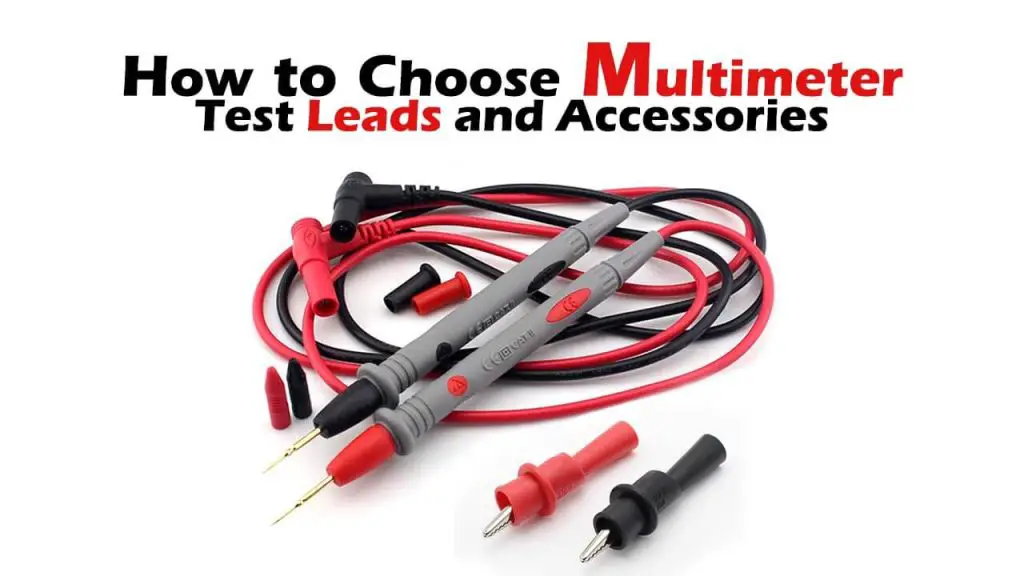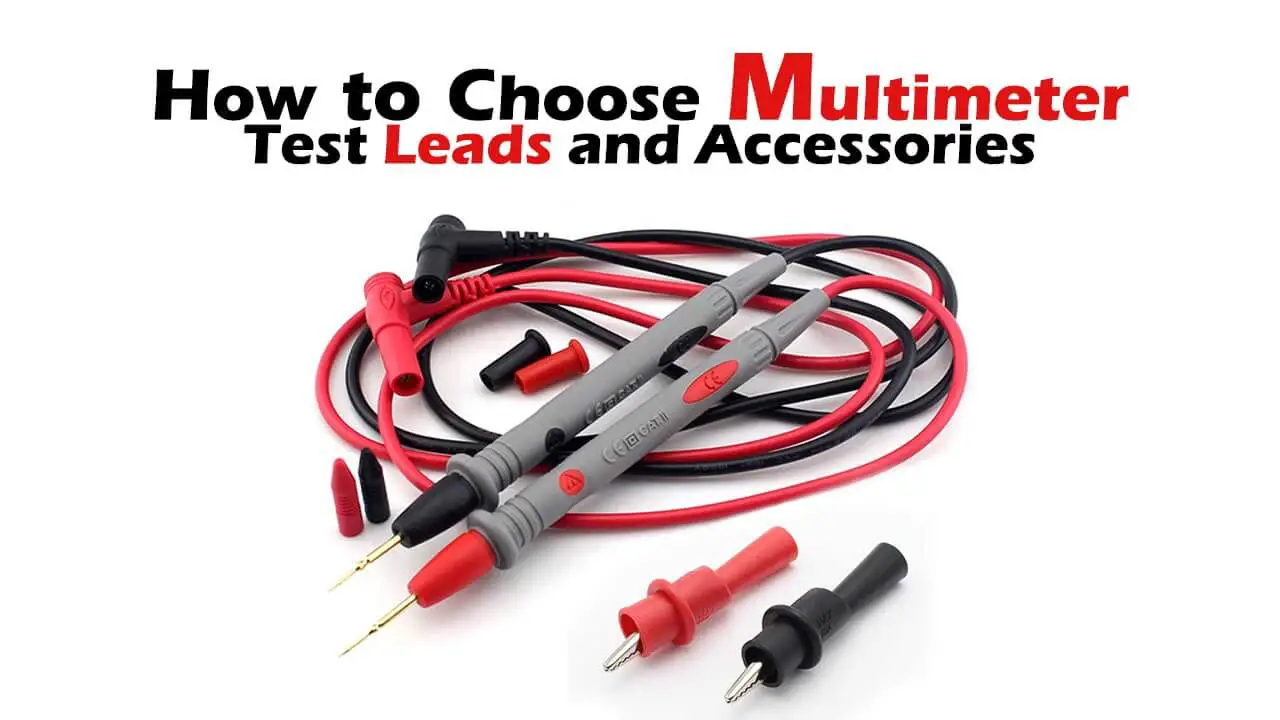How to Select Test-Leads & Accessories for Multimeters?
Today we share an article with you about some of the accessories we use for multimeters snap, slash, clamp meters or test instruments. That we may be using this is most of them that we are writing under this article. But these are some of the main ones that we use daily while we are in the field testing, working.

Table of Contents
Multimeters Accessories Buying Guide
Alligator clips
Alligator clips or crocodile clip is sprung metal clip with long jaws. These are used for connecting electrical circuits. Some are like a tiny small alligator clip and others are large. These are thick flexible, perfect alligator clips jumpers, and they are on both sides that is outstanding to have this on both sides.
The Alligators made by Fluke are perfect in use, and these alligator clips are solid, strong, large, and have a good grip. Although I used these, I do not like small tiny ones. They are suitable for nothing, but I prefer to buy the Fluke alligators because they are a good size.
The other alligators are from green lee. You can press it, and the jaws will open. We used it for the same purpose as others; they are good jumpers, but the shape or the make is not very impressive. They are also large and work perfectly, but mechanically, the body is different. In clamping, it is not as good as the Fluke alligators.
Gripper Hooks
When we are working on circuit boards or maybe working on the contact’ there are wires or small wires, we cannot use alligator clips, and they justFluke PM9082 Dual Banana Jack (female) to male BNC Adapter.
The set consists of two adapters. One red (signal) and one black (ground) 4-mm banana contact. do not fit here right on it. So then we will use these sort of grippers hooks, and Fluke makes these.
These are used to grip small wire easily, we will get a piece of wire to transform, a sixteen or eighteen gauge wire, or to use to test something on a circuit board or to test a capacitor, just insert it from the back end, and it will open its jaws from the front end and grip the wire. So these grippers would grip it; you put it inside the wire, and you do not have to worry about how hard your test lead on it or how easily it can hold. And these are also from Fluke.
Fluke Fuse Test Probes
These two are the tests fused probes by Fluke, and I think all electricians should invest in ease. Many people worry about if the meter itself is fused, and everyone should worry about it. They are being p, protected, and that is a good thing I worry about being protected. Also, this has the same size of fuse in it that is fixed inside the Fluke multimeter, so you could not go wrong with these. Both of them are black and red, and it can’t go wrong with that, and with the help of these, you will get the extra protection. The pointed end plastic part comes off too if needed, but I like using it with minimal exposure to the metal part when you are testing to prevent our hands.
Fluke extenders
There are extensions for these fuse test probes, and the function of these extensions are for keeping your hands out of the panel. What I do with these is if I will fit these behind the fuse probes to extend it. You can use these extensions with your leads or in the funnel on the alligators. The size of these Fluke extensions is standard it can fit with the accessories of green lee. These are called Fluke extenders and then I think just worth every dollar; these are by Fluke.
Insulation Piercing leads
The installation piercing leads have a pinpoint on it, all the time if you are dealing with D/C and let us say you are working on an electric car something like that, where these were pierced insulation in the negative and a positive battery cable. So whatever is your use, just stick it through the kit or in a hole because that is sharp enough to do things like that. Therefore, these are called piercing probes. These are by fluke as well.
Fluke AC220 Crocodile Clip Set
These crocodile clip sets have a blunt tip to grab around the screw head up to 9.5mm. The design is to improve steadiness in slippery hands. It has rubber over mould surface and fingers gripping curves that give the electrician a comfortable and reliable grip on the accessory to give them the exact measurements.
Fluke AC 89 Heavy Duty Insulation Piercing test clips
These clips are excellent too, these are the same as these installation piercing probes but these work kind of differently. It has a bit top of it a needle, put it in there, put your probe into the back of it and get a reading in a pierced insulation. These are from Fluke, Its small pin allows for self-healing of the insulation wire. It is CAT IV 600V, CAT III 1000V, 5A rated.
Fluke MP1 Magnetic Probes leads
These are magnetic probes. Sometimes you are working in a panel, not your standard electrical panel, to check true RMS, you may be in an industrial setting where there is a terminal block, and you cannot put your alligator clips on, and you can not hold this all day long, only trying to get a reading. So what you would do, is take these magnetic probes. You will put this on the back of, let’s say, with any multimeter leads, put one on here, but the other side into your meter, and this magnetically ends on the screw and in a hole, and these are some pretty strong screws like projections. It will give you an idea of pretty strong screws, and that’s how that work.
Fluke TP 88 Receptacles Probes
These are working with a test probe; these are better alone. Comes in pairs, these two-inch-long are rigid probe pins. It can easily pass between the pack seal and wire. The tip is a sharp point that ensures good contact with the electrical connector, and the insulation pin protects it from shorting to the other cables.
These are not like your standard probes, they are not round or anything here this is, to push into the receptacle, and these are dedicated probes made just for that purpose by Fluke.
Fluke SV225 stary voltage adaptor
It is rated CATIII 1000V and CATIV 600V. The adaptor is called SV 225 stray voltage Eliminator. What does it do? If you have a multimeter or let’s say the multimeter you have got doesn’t have low Z, but if I plug this adaptor into the multimeter and I wasn’t trying to read well now. With this adapter, I just turned on this multimeter. The feature that it didn’t have, which will be low volts are searching for ghost voltage. Which will be called the red terminology is low Z. With the help of this adaptor, we will add a feature to this multimeter. I will put it on votes. I plugged my leads in here, and take a reading. Fluke adaptor is a beneficial tool accessory.
Fluke TL27 Test Leads
Powerful leads made by Fluke. These leads are Fluke TL 27, and these are not your average size test leads. As you can see, these are not your average, medium test leads; they are much thicker than the normal ones and I put it side-by-side much thicker and there are heavy-duty test leads; that’s what they have it advertised as TL 27 Fluke heavy duty test leads. So I think it’s worth it to buy.
Fluke PM9082 Dual Banana Jack (female) to male BNC Adapter
The set consists of two adapters. One red (power) and one black (ground) 4-mm banana contact. The adaptor is another accessory that I use a lot of the time – depends on what I’m working on if I’m working on a connection or what-have-you inside an air condition unit or what-have-you. This is by a BNC cable and just comes off like this well, what I do this has a positive and negative side that will be going the multimeter ports. If we are data logging or whatever we are trying to do some data login with my meters well, we know all this is the negative and positive inside ports and unscrew two connectors. Just take my readings; that’s all while I’m doing something else. I put it on min-max or whatever or data, and I’ll leave it there.
Fluke i400 A/C Current Clamp
That’s the best tool, but if you have a clamp meter then this tool is useless, but if you do not have a clamp meter you must buy this. So it’s good to have because you never know when you might need it, but anyway, this is a Fluke i400 A/C current clamp meter, our clamp adapter, and the users for multimeters turn your multimeter. So it’s good to have it. And it is worth buying.
Frequently Asked Questions
It is not necessary to buy, it depends on the usage workload and requirement.
These accessories are a helping hand for users and most importantly time-saving.
Fluke Original Accessories are built with the same attention to safety, reliability and accuracy for test tools. Fluke is the name you can trust.
Conclusion
These are the standard essential electrician tools. These are necessary accessories in the field, so we always keep enough with us. we wrote this article to help those electricians to buy good, durable and useable accessories. When you are in the field, these are very friendly and helpful. The name Fluke is for quality and durability. Most accessories we have mentioned are from Fluke. Fluke accessories are flooded in the market. we cannot put all accessories in one article, but we choose the important one just useful for you.
Related posts:
FLUKE 115 COMPACT TRUE-RMS DIGITAL MULTIMETER




